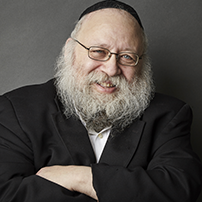
Three Questions
The end of last week’s parsha describes how Pinchas zealous killing of the consorting Jewish prince, Zimri with the Midianite princess, Cozbi, stopped the plague that killed 24,000 Jews in its tracks.
In this week’s parsha, named after Pinchas, the Torah records G-d’s response to Pinchas’ act of zealousness:
G-d spoke to Moses, to say: ‘Pinchas, son of Elazar son of Aaron the Kohen turned back My wrath from upon the Children of Israel, by his zealous avenging of My vengeance in their midst and I did not consume the children of Israel in My vengeance.’ Therefore, say: Behold I give him My covenant of peace.’”
The great Sephardic commentator, Or Hachaim (whose yahrzeit we observed this week on the 15th of Tammuz), addresses three questions:
First, why does G-d have to use the possessive “My wrath.” It could have said that he “turned back wrath.”
Second, it could have said, “by zealous avenging. There is no need to have added the possessive word “his.”
Third, the words “in their midst” are entirely superfluous. Obviously it occurred within the Israelite camp.
Personal, Pure and Public
Or Hachaim explains that G-d’s praise for Pinchas was based on three factors that made his act of vengeance a perfect act of selfless, unmitigated devotion to G-d and not for some ulterior motive.
“First, Pinchas with all his prominence he personally took vengeance and put himself in danger, as stated in the word of our Sages. This is what the verse means when it says by ‘his zealous avenging’ with the emphasis on the word ‘his.’”
Second, his vengeance was for G-d’s honor exclusively, not for any ulterior motive. This is what makes a perfect Mitzvah, which pleases G-d more than anything else that a person does. This is what the verse means when it states, ‘My vengeance, referring to the narrator, blessed is He.”
Third, Pinchas did not act in private, hidden from other people; rather he sanctified the name of G-d in the midst of the congregation and assembly, as our Sages of blessed memory stated that the entire tribe of Shimon was around the tent that in which Pinchas pierced the two and killed their leader, Zimri, in their presence. This is why the verse says in their midst.”
A cursory examination of the Or Hachaim’s analysis would suggest that Pinchas’ actions were ideal because of three separate virtues: He personally got involved, he did it for pure motives and he did it in public.
Interconnected
A deeper examination of the Or Hachaim’s thesis suggests that all three virtues are interconnected and emanated from one well of holiness that Pinchas possessed.
In Chassidic parlance there are two personality types referred to as pnimi and chitzon. The pnimi is a person who is utterly sincere, deep and inward. When a pnimi does something, particularly a Mitzvah, he or she does it with his or her entire being. Whatever they engage in they do with total concentration and dedication. They are totally focused on what they do and will not even think about the next mission. The reason the pnimi behaves in this manner is because his or her motivation derives from their inner soul and not from the soul’s periphery.
The chitzon, by contrast, is a shallow individual who invests only his or her most superficial efforts in whatever he or she does. Whatever they do does not emanate from their soul’s inner sanctum but from their most external soul powers.
Pinchas was a consummate pnimi. When Pinchas saw the degeneration of the Jewish people and the devastation it brought in its wake, it touched the deepest precincts of his soul and is what motivated him to take action.
When a pnimi is motivated to take action he doesn’t think about himself and his own safety; he acts and acts personally. And because he is motivated by the dictates of his inner soul, which is a part of the Divine, there can be no ulterior motives for the true zealot’s behavior.
And thirdly, when a person is motivated by ulterior motives because the source of the motivation is superficial, one prefers doing things discreetly so that he does not receive criticism from others. The chitzon is extremely sensitive to criticism and seeks to couch his or her actions where it would garner the least amount of notoriety. Not so the pnimi who seeks to publicize what he thinks is morally just without any personal considerations.
Counterintuitive
On the surface this third point seems to be counterintuitive. Isn’t the sincere person one that does not seek honor or recognition and acts humbly and inconspicuously? The braggart, on the other hand, is usually one who is filled with his own self-importance and ego.
The truth is that true humility that comes from one’s inner soul can manifest itself in two opposite ways.
On the one hand, a truly humble person will try to conceal his achievements, particularly when it will bring him fame and glory. Moses set the tone for great Jewish leaders who shunned the limelight and eschewed fame and power. What they did they did for G-d and for G-d exclusively.
Conversely, when a truly humble person is confronted with a challenge that will only cause him ridicule and contempt by others, but will magnify G-d’s presence, as was the case with Pinchas, the humble pnimi will not shy away from performing that act.
The rationale behind this assertion is that the pnimi is not acting on his subjective sense of truth and righteousness, but is driven exclusively by his inner soul’s divine identity. He will therefore not stop at anything to fulfill his mission, even at great personal cost. To do that which is morally right the humble pnimi will overlook his profound aversion to publicity, risk suffering from ridicule, or even worse, agonize from adulation which he finds repulsive.
The Reward
We can now shed light on the reward Pinchas was given by G-d; that he would be a Kohain, although he was skipped over initially when G-d anointed Aaron and his four sons. Normally, one cannot identify as a Kohain unless they were so anointed by G-d, or their descendants who were born after the anointing of their parents. Pinchas was born after his father was anointed and therefore excluded from the priesthood. How then could he become something he was not? If the priesthood was merely an honorific title or an appointment to a certain position of authority it would make sense. But the priesthood is hereditary. How then could he have become a Kohain if he did not inherit this status from his father?
The answer is that Pinchas had the Kohain spiritual gene in him but was not able to manifest it openly. That changed when he performed this act of zealotry, which allowed him to express his soul’s inner holy of holies. When that part of the soul was revealed it allowed for his latent Kohain gene to come to the surface as well.
“Humble Ones, the Time of Your Redemption has Arrived”
When the Midrash describes Moshiach’s announcement to the Jewish people that the time for their Redemption has arrived, it prefaces that statement with the words: “Humble ones…”. Why does Moshiach refer to the people as humble ones rather than righteous ones?
Perhaps, the definition here of humble ones is that their inner soul is revealed. When that happens a person loses their ego and is dedicated to doing G-d’s will without any regard for their own interests. This is the sign that they are ready to welcome Moshiach.


